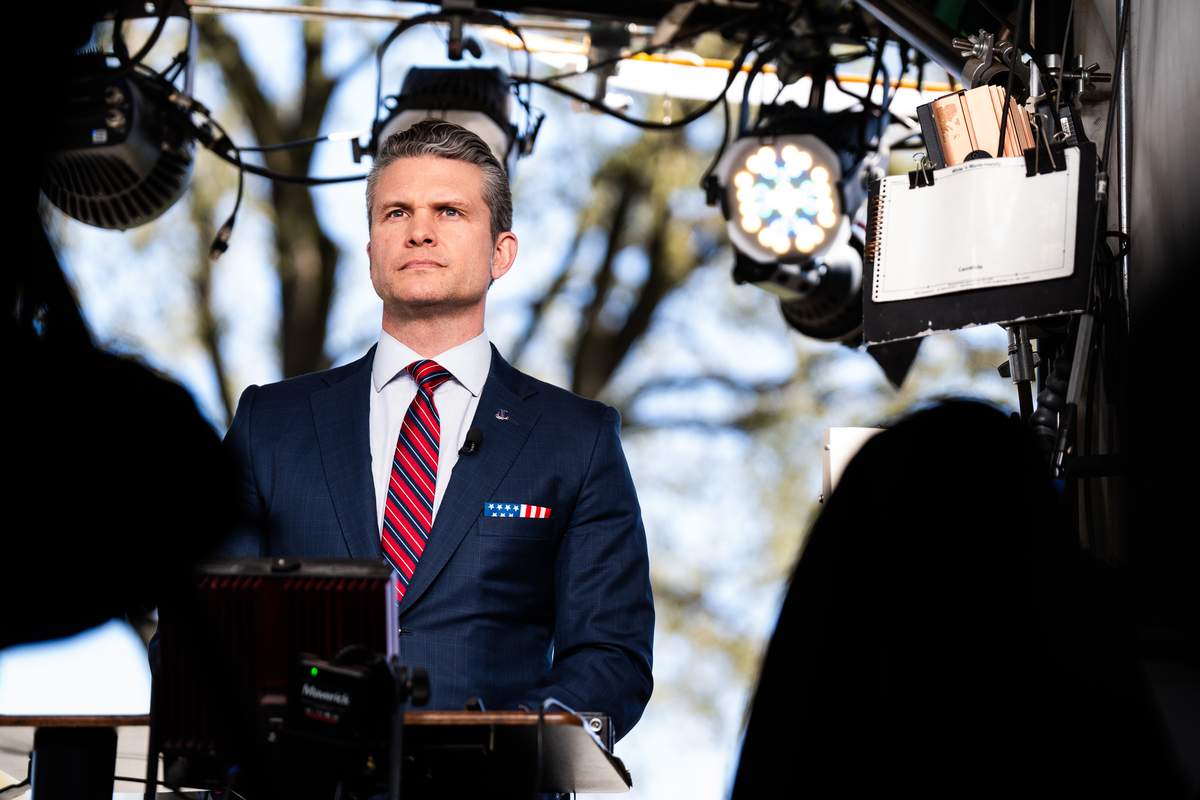
Defense Secretary Pete Hegseth does a TV hit outside the White House on March 21.
12:46 JST, April 23, 2025
Defense Secretary Pete Hegseth is facing growing scrutiny over his use of the commercial messaging app Signal to discuss U.S. military operations, including operational details about strikes in Yemen.
The controversy began when Jeffrey Goldberg, the Atlantic magazine’s editor in chief, reported last month that he’d been included in a group chat in which Hegseth shared sensitive information. On Sunday, the New York Times reported that Hegseth had discussed similar details in a separate Signal chat, this time including his wife, brother and personal lawyer.
Neither Hegseth nor the White House has denied the messages are real, but they’ve insisted the information shared wasn’t classified. Still, backlash has grown as lawmakers, former officials and cybersecurity experts question whether Hegseth mishandled national defense information – and whether the Trump administration is doing enough to protect it.
Here’s what to know.
What did Hegseth discuss in the Signal chats?
In two reported group chats on Signal, Hegseth shared details about military operations in Yemen on March 15.
One of those private chats included senior officials – Vice President JD Vance, White House national security adviser Michael Waltz and Secretary of State Marco Rubio, among others. It also included Goldberg, who detailed the contents of the conversation in a March report.
In the chat, senior officials deliberated upcoming military strikes against Yemen’s Houthi militants, according to the Atlantic. A Signal account labeled with Hegseth’s name shared plans of the attack, including targets and weapon deployments.
Around the same time, Hegseth also shared plans of the attack in another conversation that included his wife, Jennifer, brother Phil, chief of staff Joe Kasper, spokesman Sean Parnell, personal lawyer and adviser Tim Parlatore, and senior aides Darin Selnick and Dan Caldwell, the New York Times reported Sunday.
Selnick and Caldwell were fired from the Defense Department last week after being accused of leaking information. The men disputed the allegations and said they understood “the importance of information security and worked every day to protect it.”
How have Hegseth and the White House responded?
Neither Hegseth nor the White House has disputed the authenticity of the Signal chats, but both have downplayed the seriousness of the disclosures and insisted that no classified information was shared.
When the first chat was revealed, Hegseth claimed he was merely coordinating with national security officials, without explaining why a journalist had been included in the conversation. After the revelation Sunday of a second chat, Hegseth shifted his focus to an unnamed Pentagon staffer he blames for leaking stories to the press.
“Once a leaker, always a leaker, often a leaker,” Hegseth told Fox News on Tuesday. “I don’t have time for leakers. I don’t have time for the hoax press that peddles old stories from disgruntled employees.”
The White House has continued to publicly stand by Hegseth, even as backlash intensifies. Trump on Monday insisted that the defense secretary is “doing a great job.”
“It’s just fake news. They just bring up stories,” Trump said. “I guess it sounds like disgruntled employees. You know, he was put there to get rid of a lot of bad people, and that’s what he’s doing. So you don’t always have friends when you do that.”
What have lawmakers said?
While Democrats quickly criticized Hegseth over his use of Signal, few GOP lawmakers have spoken out.
After backlash over the first group chat, the top Republican and Democrat on the Senate Armed Services Committee – Sens. Roger Wicker (R-Mississippi) and Jack Reed (D-Rhode Island) – requested that the Defense Department inspector general’s office open a review into the matter.
Reed publicly condemned the report of a second group chat, saying that if the report is accurate, it is another example of Hegseth failing to follow protocol.
“He must immediately explain why he reportedly texted classified information that could endanger American servicemembers’ lives on a commercial app that included his wife, brother, and personal lawyer,” Reed said in a statement. “I urge the Department of Defense Office of Inspector General to include this latest incident in its ongoing investigation of Mr. Hegseth’s mishandling of classified information.”
Wicker, who voted to confirm Hegseth but previously said the secretary wasn’t his “choice for the job,” has not addressed the issue again. A spokesman for Wicker declined to comment further on Tuesday.
Rep. Don Bacon (R-Nebraska) is so far the only Republican lawmaker to call for Hegseth’s removal, while Sen. Marsha Blackburn (R-Tennessee), Rep. Abraham Hamadeh (R-Arizona) and Sen. Markwayne Mullin (R-Oklahoma) have defended the embattled secretary.
What are the rules for communicating classified information?
Under Pentagon rules, the kind of operational details Hegseth shared on Signal – including targets, weapons and strike timing – would be relegated to a special, compartmented channel with its own code word and tightly limited access, former Defense Department officials previously told The Washington Post.
In general, high-level classified information is handled in person and in secure rooms. The facilities with those rooms, called SCIFS, are designed to prevent adversaries from listening.
The only people who should have access to classified information are those cleared to do so by national security protocol, those who need the information for their jobs and those who have signed a nondisclosure agreement, according to the Center for Development of Security Excellence, a directorate in the Defense Counterintelligence and Security Agency.
Although Signal is encrypted, it’s not authorized for communicating sensitive or classified national defense information. The Pentagon’s chief information officer in 2023 banned the use of Signal for sharing any nonpublic information, even if unclassified.
A recent National Security Agency memo reviewed by The Post noted that federal policies on Signal vary widely across agencies and recommended creating a unified standard to avoid violations of recordkeeping laws and national security protocols.
Legal experts previously told The Post that Hegseth’s use of Signal may have violated multiple federal laws, including the Espionage Act, which penalizes officials who “through gross negligence” allow national defense information to be mishandled or shared outside proper channels. The experts said the actions could also run afoul of the Federal Records Act and the Presidential Records Act, both of which require the preservation of official communications – including those sent over encrypted apps.
– – –
Dan Lamothe, Warren P. Strobel, Missy Ryan, Hannah Natanson, Praveena Somasundaram, Kyle Melnick and Gaya Gupta contributed to this report.
Top Articles in News Services
-

Survey Shows False Election Info Perceived as True
-

Hong Kong Ex-Publisher Jimmy Lai’s Sentence Raises International Outcry as China Defends It
-

Japan’s Nikkei Stock Average Touches 58,000 as Yen, Jgbs Rally on Election Fallout (UPDATE 1)
-

Japan’s Nikkei Stock Average Falls as US-Iran Tensions Unsettle Investors (UPDATE 1)
-

Trump Names Former Federal Reserve Governor Warsh as the Next Fed Chair, Replacing Powell
JN ACCESS RANKING
-

Producer Behind Pop Group XG Arrested for Cocaine Possession
-

Japan PM Takaichi’s Cabinet Resigns en Masse
-

Man Infected with Measles Reportedly Dined at Restaurant in Tokyo Station
-

Israeli Ambassador to Japan Speaks about Japan’s Role in the Reconstruction of Gaza
-

Videos Plagiarized, Reposted with False Subtitles Claiming ‘Ryukyu Belongs to China’; Anti-China False Information Also Posted in Japan


























